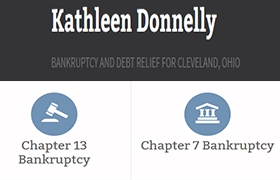Cleveland Collection Lawyer, Ohio, page 4
Sponsored Law Firm
-
 x
x

Click For More Info:
-
Law Office of Kathleen Donnelly
526 Superior Ave #1030 Cleveland, OH 44114» view mapChapter 7, Chapter 13, Free Evaluations Need Debt Relief? Contact Me Today
There is hope for debt relief. At the Cleveland, Ohio, law office of Kathleen Donnelly, we help people like you to escape from under mountains of debt.
800-413-4100
Matthew James Mccracken
Construction, Litigation, Employee Rights, Collection
Status: In Good Standing Licensed: 21 Years
Andrew Stuart Pollis
Litigation, Insurance, Collection, Personal Injury
Status: In Good Standing Licensed: 34 Years
Matthew David Gurbach
Litigation, Insurance, Collection, Medical Malpractice
Status: In Good Standing Licensed: 21 Years
Amy Clum Holbrook
Litigation, Dispute Resolution, Banking & Finance, Collection
Status: In Good Standing
Amanda Rasbach Yurechko
Real Estate, Electronic Commerce, Collection, Commercial Bankruptcy
Status: In Good Standing
David Andrew Head
Litigation, Commercial Banks, Collection, Bankruptcy & Debt
Status: In Good Standing

 Kathleen Donnelly Cleveland, Ohio
Kathleen Donnelly Cleveland, Ohio About UsKathleen Donnelly
About UsKathleen Donnelly Contact UsCall or Email Right Now
Contact UsCall or Email Right Now
